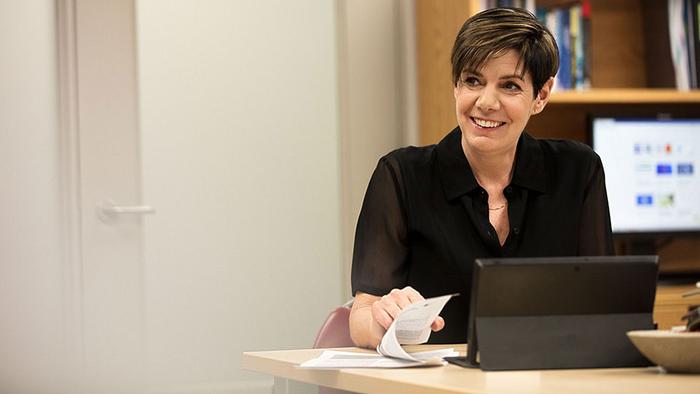Barcelona, Spain: Bystanders are less likely to give cardiopulmonary resuscitation (CPR) to women than men, particularly if the emergency takes place in a public area, according to research presented at the European Emergency Medicine Congress today (Monday) [1]. The study also shows that in private locations older people, especially older men, are less likely to receive CPR.

Credit: Sylvie Cossette/EUSEM
Barcelona, Spain: Bystanders are less likely to give cardiopulmonary resuscitation (CPR) to women than men, particularly if the emergency takes place in a public area, according to research presented at the European Emergency Medicine Congress today (Monday) [1]. The study also shows that in private locations older people, especially older men, are less likely to receive CPR.
The researchers say that CPR saves lives and urge people to learn how to perform CPR and to give it without hesitation to anyone who needs it, regardless of gender, age or location.
The research was presented by Dr Sylvie Cossette, a PhD nurse researcher at the Montreal Heart Institute research center, Canada. She conducted the research with Dr Alexis Cournoyer, an emergency medicine physician and researcher at the Hôpital du Sacré-Coeur de Montréal, Canada.
Dr Cournoyer said: “In an emergency when someone is unconscious and not breathing properly, in addition to calling an ambulance, bystanders should give CPR. This will give the patient a much better chance of survival and recovery.”
Dr Cossette added: “We carried out this study to try to uncover factors that might discourage people from delivering CPR, including any factors that might deter people from giving CPR to a woman.”
The researchers used data from records of cardiac arrests that happened outside of hospital in Canada and the US between 2005 and 2015, including a total of 39,391 patients with an average age of 67. They looked at whether or not a bystander performed CPR, where the emergency took place, and the age and gender of the patient.
They found that only around half of patients received CPR from a bystander (54%). Overall, women were slightly less likely to be given CPR (52% of women compared to 55% of men).
However, when the researchers looked only at cardiac arrests that happened in a public place, such as the street, the difference was greater (61% of women compared to 68% of men). These lower rates of CPR in public were found in women regardless of their age.
When the researchers looked at cardiac arrests that happened in a private setting, such as a home, the data indicated that with every ten-year increase in age, men were around 9% less likely to be given CPR during a cardiac arrest. For women having a cardiac arrest in a private setting the chances of receiving CPR were around 3% lower with every ten-year increase in age.
Dr Cournoyer said: “Our study shows that women experiencing a cardiac arrest are less likely to get the CPR they need compared to men, especially if the emergency happens in public. We don’t know why this is the case. It could be that people are worried about hurting or touching women, or that they think a woman is less likely to be having a cardiac arrest. We wondered if this imbalance would be even worse in younger women, because bystanders may worry even more about physical contact without consent, but this was not the case.”
Dr Cossette said: “We would like to study this issue in greater detail to understand what lies behind the difference. This could help us make sure that anyone who needs CPR gets it, regardless of gender, age or location.”
Professor Youri Yordanov from the St Antoine Hospital emergency department (APHP Paris), France, is Chair of the EUSEM 2023 abstract committee and was not involved in the research. He said: “CPR saves lives, but sadly not everyone who suffers a cardiac arrest will get the CPR they need. This study gives us some clues about why that’s the case. A cardiac arrest can happen anytime and anywhere, so we all need to learn CPR and to be willing to perform it without hesitation.”
Method of Research
Observational study
Subject of Research
People




